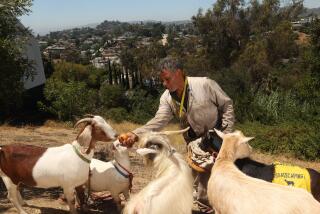Oregon Man Takes Aim at Cattle Along With Open-Range Law
JOHN DAY, Ore. — One fine fall day a year ago, Dr. Patrick Shipsey, his wife and two young daughters drove out to their 960 acres to plant grass along a creek that was healing from generations of overgrazing.
When Shipsey saw that his neighbor’s Herefords had gotten inside his fence again, he pulled out his favorite rifle, walked to within 50 yards of the cattle and, with calm deliberation, dropped each of the eight cows in its tracks with a bullet to the base of the skull.
Shipsey, who was convicted of criminal mischief and unauthorized use of livestock after a 30-minute nonjury trial last week, could face more than 55 years in prison and loss of his medical license. But prosecutor Patrick Flaherty said Shipsey would probably get no more than 10 days in jail and two years’ probation, plus community service and payment of restitution. He will be sentenced within the next two months.
Shipsey vowed to appeal.
Earlier, he said he was less concerned with being caught than with spotlighting an open-range law he considers ludicrous.
The law allows ranchers to hold others liable for the welfare of their cattle, no matter where they roam. The concept holds sway a century after its inception in Oregon, Montana, Idaho, Utah, Wyoming and parts of Texas.
It goes against much of American jurisprudence but is well understood in cattle country.
“When you build a fence in this country, it isn’t to keep your cattle in; it’s to keep your neighbor’s cattle out,” said barber Joe West as he trimmed the hair of John Hays, president-elect of the Oregon Cattlemen’s Assn.
Cattle still are herded down Main Street in this eastern Oregon town of 2,000. Hays said ranchers need open range to move their herds.
“It’s just the law of the West,” he said.
The man with the dead cattle, Bob Sproul, sees Shipsey as an outsider threatening a traditional way of life. The two had argued for years over cattle getting through Shipsey’s fence and grazing in the creek bottom he had worked hard to restore.
“[Newcomers] love it here and want to change our history and laws,” Sproul said. “Why don’t they just stay away? The cattle and men who own them in these vast areas can’t protect a garden patch.”
Shipsey, a conservationist, is not so different from the locals. Reared in Klamath Falls, a community in southwestern Oregon, and in cattle and timber country, Shipsey feels a strong connection to the high desert.
Though his hair falls to his shoulders and his musical taste runs to rocker Neil Young, he owns 20 guns and breeds wolf-dog hybrids. Driving 80 miles from his home in Baker City, he went to work at his medical practice here in a plaid shirt, jeans and a pair of moccasins with the toes chewed out by his dog.
People still remember that Sproul had his own day in court in the late 1950s. He was charged with murder for killing his brother-in-law, Link Williams, in a dispute over a road Sproul used to move cattle. The jury acquitted him after he testified that Williams fired first.
Shipsey got no such understanding. He has been shunned in town. His own patients say he was wrong to shoot the animals. Many left, and the lost income forced him to sell the land he defended with a gun. He said he would close his practice last week.
His lone regret is that he shot the cattle as state residents were about to vote on a measure to force ranchers to fence their cattle out of streams that fail to meet federal clean water standards. Already headed for defeat, the measure was trampled.
Before the trial, Shipsey appeared at ease as he rocked in a chair in his office.
“It’s just a matter of looking at the big picture rather than what is going to happen to my savings account,” he said. “The worse it goes for me, the more ridiculous that law is going to look.”
He gave up hope of a jury trial after Judge Jarry Reynolds ruled that the defense could not offer evidence that Sproul was well known for allowing cattle to graze where they shouldn’t, and that Sproul could not be cross-examined about his grazing practices.
Shipsey was convicted in the deaths of 11 cattle, including the eight he shot last year and three others in 1995.
“I don’t think this was a trial about justice at all,” Shipsey said. “I strongly feel if I would have been a landowner who had cattle and shot someone else’s cattle on my property, this case never would have gone to trial. Only because of the political implications was it forced to a trial and a conviction.”
Hays, the president-elect of the Oregon Cattlemen’s Assn., said the dispute could have been resolved peacefully if Shipsey had just called the sheriff to impound the cattle, rather than shooting them.
Sharon Beck, current president of the Oregon Cattlemen’s Assn., said she hopes the open-range law will survive, because it is important to the cattle industry.
“We don’t want any problems with our neighbors or making a living,” she said. “We’ve gotten along for over a century, and this has worked until people who don’t understand our way of life move into the area and want to change things to the way they are in their urban backyard.”
More to Read
Sign up for Essential California
The most important California stories and recommendations in your inbox every morning.
You may occasionally receive promotional content from the Los Angeles Times.










